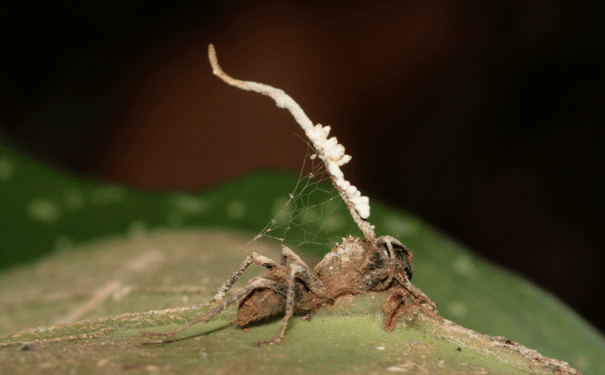
A fruiting body of the Ophiocordyceps fungus extends from the head of an infected ant. Image: David Hughes
Newly discovered parasite fights the zombie-ant fungus.
Scientists first reported the zombie fungus (Cordyceps) back in March of 2011. The fungus invades the ant’s brain and directs it to leave the colony; the ant dies in an exposed position, such as biting onto the edge of a leaf. Researchers at Penn State University, US, have discovered another organism that is able to limit the one that turns ants into zombies.
“In a case where biology is stranger than fiction, the parasite of the zombie-ant fungus is itself a fungus — a hyperparasitic fungus that specialises in attacking the parasite that turns the ants into zombies,” says David Hughs of Penn State University in a press release. The fungus castrates the zombie fungus so it cannot spread its spores, making only 6.5 per cent of spores viable. This explains how an ant colony can survive once it has been infected with the fungus.

Before killing the ant, the fungus growing from ant's head changed the ant's behaviour, causing it to bite into the leaf vein. Image: David Hughes
“Even though there are a lot of dead and infected zombie ants in the neighbourhood, only a few of the spores of the zombie-ant fungus will become mature and able to infect healthy ants,” Hughes says. “Our research indicates that the danger to the ant colony is much smaller than the high density of zombie-ant cadavers in the graveyard might suggest.”
And it appears that healthy ants are also fighting back. Researchers at James Cook University, Queensland, who worked in collaboration with researchers at Penn State, have found native green ants attacking and dismembering infected ants in the colony, much like humans attacking zombies in horror movies.
Researchers are still unsure why the ants act in such a strange manor. Penn State Biologist Dr Anna Schmidt says “the healthy ants encounter the infected ants and think: “˜hey that’s bad I’d better destroy it,’ or “˜hey that’s something I can eat’.”
Hughs and his team plan on expanding their efforts to fully comprehend the mechanisms behind the complex interactions between ant colonies, their brain manipulating parasites and other fungi capable of lending assistance to the colony.






